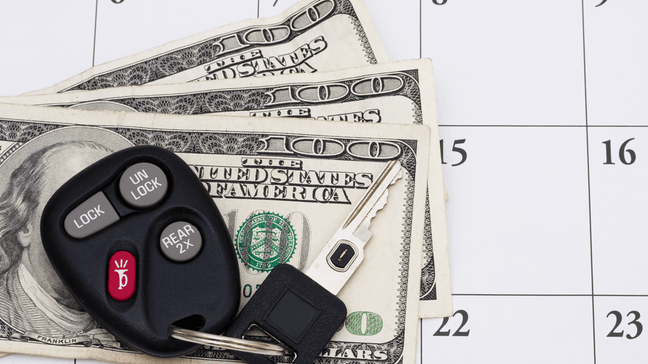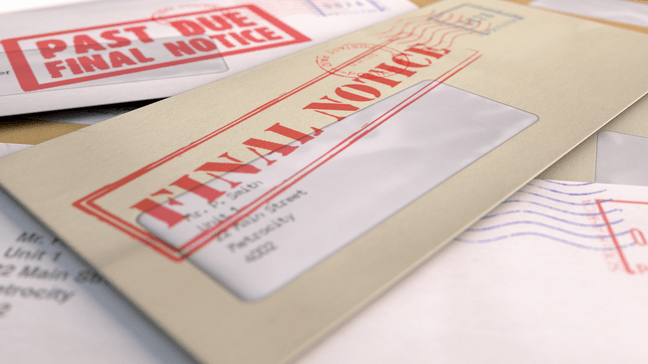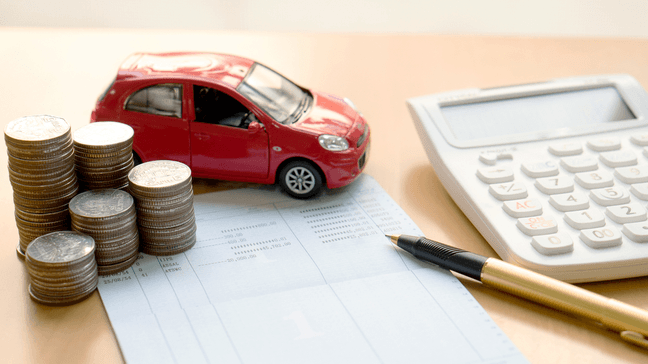If you’re currently financing your vehicle, you’re not alone. Millions of Americans finance their daily drivers, and data shows that consumer auto loan debt is at an all-time high.
When you get approved for an auto loan and sign on the dotted line, you agree to a certain set of terms, which includes the monthly payment you promise to make over the loan term. As long as you pay the lender on time every month, you’re allowed to keep the car in your possession.
But what happens if you miss one of those car payments? The shorter answer is nothing good.
I’m going to break down the consequences of missing one or multiple car payments, what might happen to you (and your vehicle), and how you can get back on track if you’re falling behind.
I missed a car payment—now what?

Missing a car payment is not an ideal situation, but it may not be the end of the world. The severity of the situation really depends on how many payments you’ve missed.
For example, let’s say that you’re on a tropical island getaway over the winter holidays, and you forget to make your December car payment. If it’s the first payment you’ve missed, your lender will probably let it slide, as long as you pay it a few days later. Lenders know that you’re human, and they aren’t going to come after you for missing one deadline, especially if you’ve been consistent prior to that.
However, it’s a much different situation if you’ve missed the last five car payments and you haven’t been in touch with your lender. At that point, your lender is likely getting frustrated, and they’re probably concerned that you’re going to stop making your payments altogether.
In either situation, you can expect a few things to happen if you miss one or more car payments:
You’ll hear from your lender
As soon as your car payment is officially “late,” your lender is going to reach out and notify you of the missed payment. Keep in mind that every lender has a different definition of a late payment. It’s possible that your auto loan contract has a built-in grace period, which gives you a few extra days to make the payment if you miss the real deadline. But after the grace period ends, your lender might tack on penalty fees to your late payment.
Your credit score could drop
Your loan grace period can surely be a saving grace, but it’s usually short-lived. If your car loan payment is more than 30 days late, your lender might have to report it to the major credit bureaus. That means you’ll lose a few points on your credit score.
If you want to preserve an excellent credit score or are working on improving your credit score, making your car payments on time is crucial.
Your car might get repossessed
If you ignore your lender’s notifications and continue missing your car payments, your car will eventually get repossessed. Remember that auto loans are secured, and your car is used as collateral. That means your lender has the full legal right to repossess your vehicle if you stop making the agreed monthly payments. After all, you don’t technically own the car until your loan is fully paid off.
Can I go to jail for missing my car payments?

Even though you sign a legal contract when you enter into an auto loan agreement, it’s highly unlikely that you could go to jail if you miss your car payments, or fall behind. In fact, your lender probably won’t take any sort of legal action if you default on your loan.
However, there is one thing to be aware of. When your vehicle gets repossessed, voluntarily or not, the lender will likely sell the car in an attempt to get the money back that you couldn’t pay. If the sale price of the vehicle is less than the amount you owed on the loan, it’s possible that the lender could sue you for the difference. You won’t go to jail, but you will have to appear in court.
If you default on your auto loan, the worst-case scenario is that your lender will repossess your vehicle, which means you could get stranded without a car. But I can’t neglect to mention the non-legal consequences of defaulting on your auto loan. Your credit score could plummet, and you could end up in a lot of debt. Better than jail time, but a serious consequence nonetheless.
What to do if you’re struggling to make your car payments

Falling behind on your car payments can be very stressful, especially if you’re struggling to afford the monthly cost while juggling other bills, like a mortgage or childcare. However, there are ways to rectify the situation. Here are some things you might consider doing:
Contact your lender
If your financial situation changes and you’re no longer able to make your car payments, contact your lender immediately. Don’t wait until you are several months behind to reach out. In this situation, being proactive can actually work in your favor. Your lender will appreciate the heads up if you know that you’re unable to make future payments.
After talking with your lender, there are a few things they can do. First, they may offer to work out a payment plan to make the cost more affordable. An example might be making smaller payments twice a month, rather than one big monthly payment. You could also ask your lender to change the due date of your loan payment so it falls on a day after you get paid.
Ask about a loan deferral
Some auto lenders will allow you to defer your auto loan, which essentially pauses your monthly payments for a certain period of time. This can be a good option if you have an unexpected expense come up, like a medical bill or major car repair, that makes it difficult for you to make your car payments.
If your lender allows for a deferral, it’s important to weigh the pros and cons first. In most cases, a loan deferral is only available for a few months, so it’s not a long-term solution. Also, you won’t be off the hook for those payments completely. Your lender will expect you to make up the payments later on by extending your loan term.
Refinance your auto loan
Before you fall way behind on your car payments, consider refinancing your auto loan. This is particularly beneficial if you feel like your loan interest rate is too high.
Refinancing a loan ultimately means you are replacing your existing loan with a new one. It can be a good way to lower your monthly payments if you refinance for a longer loan term.
Refinancing an auto loan doesn’t lower the amount of money you owe, it simply allows you to pay it off over a longer period of time. But this option has pros and cons, too. You’ll pay less each month, but you’ll probably end up paying more interest over the lifetime of your loan, even if you’re able to refinance to a lower interest rate.
Sell your car
No one wants to give up their vehicle voluntarily, but here’s the truth—if you can’t afford it, you probably shouldn’t be driving it. Avoid the stress of your expensive car payments, and sell or trade in your vehicle instead. Your payments will stop as soon as the title is transferred to someone else, whether it’s a dealer or a private buyer.
There’s one big caveat to know about selling your car when it has a lien (i.e. your lender’s name) on the title. You are entitled to the money from the sale, but you must pay your lender the difference between the sale value and the remaining loan balance. Before you sell your vehicle, contact your lender to find out how you should handle the transaction and loan repayment.
Surrender your vehicle
If you’ve exhausted all of your options and your car is on the verge of getting repossessed by the lender, it’s time to consider surrendering your vehicle. Voluntarily surrendering your car shouldn’t be taken lightly, but it could end up costing less than letting your lender repossess it on their terms.
The actual process of surrendering your vehicle is pretty easy. Just contact your lender and let them know that you can no longer make the payments, and you wish to voluntarily surrender your car. You’ll leave the keys and the car with a lending agent, and be on your way (make sure to arrange a ride home first). Voluntarily surrendering your vehicle will have a big impact on your credit score, but at least you won’t be greeted by a repossession agent who can seize your vehicle at any time.
Summary
The moral of the story is this: do your very best to make your car payments on time. Missing one payment is usually forgivable, but if you’re a repeat offender, it’s going to come back to haunt you.
If your financial situation changes and you become unable to make your loan payments, don’t be afraid to reach out to your lender. There are ways to lower your monthly payment and pause your payments temporarily so you catch up.
Above all else, the biggest piece of advice I can offer is this—don’t finance a car you can’t afford. Before you even start car shopping, use MU30’s auto loan calculator to figure out how much you can spend on a car to keep your monthly payment within your budget.


